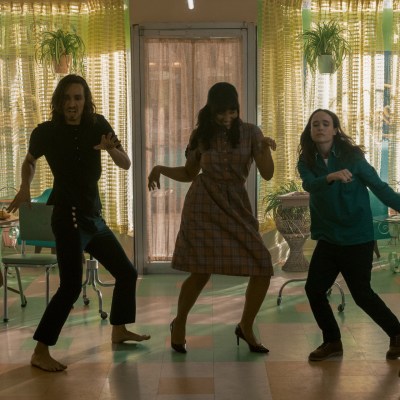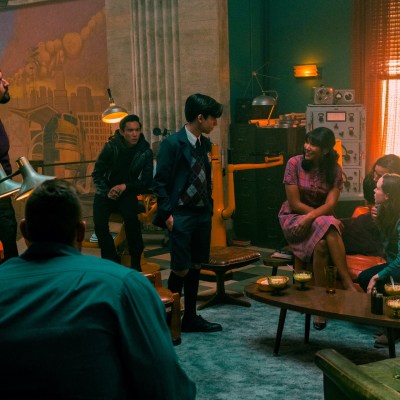The Umbrella Academy Season 2 Review (Spoiler-Free)
A new apocalypse gives The Umbrella Academy a thrilling 1960s adventure in which to explore the characters we’ve grown to love.

Any successful sophomore season has to build on the strengths of its predecessor, particularly in the areas of world building and characterization, and create a compelling new conflict to grab the audience’s attention, and The Umbrella Academy season 2 does just that. One would think that presenting another impending apocalypse for which our heroes are once again responsible would be repetitive, but if anything, this end-of-the-world scenario is even more thrilling because it places everything and everyone in the context of 1960s Dallas just before the assassination of President John F. Kennedy, a quintessential time travel setup second only to going back and killing Hitler.
Everyone on the team (even Ben; especially Ben!) is a thousand times more interesting in this new setting, and they were already pretty incredible to begin with! This article is billed as a spoiler-free review — and it is! — but we’ll have to at least explore where the various characters find themselves after being scattered by the time jump at the end of last season because their new lives are key measurements in evaluating the success of The Umbrella Academy season 2. Don’t worry, though; commentary will be confined only to what can be gleaned from the trailer, and the critique will be based on how well each arc fulfills its potential.
One of the most dramatic stories centers around Allison, whose personal connections in The Umbrella Academy season 2 are noticeably more visible and relatable than her desire to be with her daughter last season was. Allison’s involvement in the civil rights movement and her relationship with one of its local leaders played by Yusuf Gatewood of The Originals not only feels more believable; it also allows her to have a fresh start, a life earned without powers. Additionally, the clear depiction of how the slow recovery of her voice and the racial tensions in Dallas would eventually present the overwhelming temptation to rumor her way out of a sticky situation is exquisitely painful for the viewer to witness.
Vanya similarly forms her own deep bonds with others native to the decade, and this time, even though her relationships are far from being free of conflict, they are much more honest and true to what we know about her character. Based on a chance encounter upon her arrival in Dallas, the emotional damage Vanya encountered in season one is significantly if temporarily lessened, but her great power takes The Umbrella Academy down some surprising paths that will have lasting consequences, even into season three.
The boys’ lives are only slightly less complicated, allowing for more humor even if things sometimes get dark, but The Umbrella Academy leans heavily into Luther’s leadership woes and Diego’s need to be a true hero, just as it should. Luther is much more likable this season, mildly content to eke out a living in an underground fighting ring and more concerned about Allison’s new circumstances than he is about the end of the world. Diego’s superhero complex, on the other hand, lands him in a mental institution, but a new friend named Lila, played by Ritu Arya of Humans, softens his hard edges and displays her own hidden complexities that multiply throughout the season.
Klaus and Ben, already fan favorites, enjoy some of the most cathartic moments of the season, especially once a previously unrealized aspect of Ben’s status as a ghost comes to light. The Umbrella Academy was wise to bring Ben out of the shadows, and his most triumphant moment — completely separate from Klaus — will likely inspire paradoxical tears of joy and sadness. Klaus himself also has both lighthearted and intensely emotional encounters since there’s both his new status as a guru in charge of a cult to deal with and a heartfelt story that carries over from his journey in season one.
Only Five, who besides gaining some surprising insight into his own abilities, appears mostly unchanged between seasons of The Umbrella Academy, but his knowledge of the approaching end times and his brusque inability to unite his siblings provides a welcome consistency for his character; Aidan Gallagher continues to be eerily skillful at portraying an old man trapped in a young man’s body. Five is also responsible for bringing in a new character, conspiracy theorist Elliot Gussman, whose understated cooperation provides moments of levity while he hosts the team in a kick-ass set piece in the form of a dentist’s office atop a television showroom.
There are plenty of revelations to be had surrounding the younger Reginald Hargreeves, whom astute viewers no doubt spotted in The Umbrella Academy season 2 trailer, and comics readers will be pleased to see that these include more than just backstory for him and other caretakers in the family. Likewise, fans of the comic who noticed the fishtank head of the original graphic novel’s Handler will appreciate the changed role the Commission plays in this new storyline. In particular, the assassins known only as The Swedes, while not necessarily as dynamic as Hazel and Cha-Cha, pleasantly evoke the appeal of other silent but deadly hitmen in shows like Breaking Bad and Fargo.
As in season one, The Umbrella Academy season 2 takes viewers down a winding road with plenty of twists and turns, and the ending somehow manages to contain both a sense of relief and a sudden understanding of the consequences of their time spent near the events of Kennedy’s assassination with regard to the lives they touched. The success of the series lies in its ability to make viewers care deeply for the characters, and although part of the family’s charm is its dysfunction, this sophomore season has tweaked its formula in all the right places to make the group even more likable. The conflict is well-paced and resolves satisfyingly, and the story flows with a rhythm that pulls the viewer along like the inexorable course of time itself.


